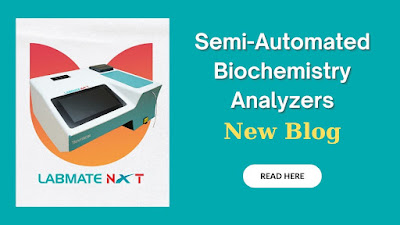Understanding Test Results from Your Semi-Automated Biochemistry Analyzer
Semi-automated biochemistry analyzers play a vital role in modern healthcare, providing valuable insights into your body's inner workings. The results from these analyzers offer clinicians objective data to guide diagnosis, monitor treatment effectiveness, and assess your overall health. Understanding the test results produced by your Semi Auto Analyzer can be empowering, fostering a sense of understanding about your health status. Let's explore what these tests reveal and how they're used in clinical practice.
Common Biochemistry Tests
Semi-automated analyzers perform a wide range of tests on various bodily fluids, including blood, serum, and urine. Some of the most common tests include:
Liver Function Tests (LFTs): LFTs assess the health of your liver by measuring levels of enzymes and proteins it produces (e.g., ALT, AST, Albumin).
Kidney Function Tests (KFTs): KFTs evaluate your kidney health by measuring substances like Creatinine, Urea, and electrolytes (Sodium, Potassium).
Lipid Profile: This panel analyzes various cholesterol types (HDL, LDL, Triglycerides) and provides information about cardiovascular health risks.
Glucose (Blood Sugar): Glucose testing is essential in the diagnosis and management of diabetes.
Electrolytes: Measuring Sodium, Potassium, and other electrolytes aids in assessing hydration, muscle function, and various health conditions.
Understanding Your Test Report
The test report from your Semi Auto Analyzer typically includes these components:
Analyte: The name of the substance being measured (e.g., Glucose, Creatinine).
Result: Your measured value for that analyte.
Units: The units of measurement used (e.g., mg/dL, mmol/L).
Reference Range: The normal or expected range for that analyte, which can vary slightly between laboratories.
Interpreting the Results: A Collaborative Process
It's crucial to note that test results should always be interpreted by a qualified healthcare professional in the context of your individual medical history and symptoms. While the reference range provides a guideline, your doctor will determine whether your results fall within a healthy range for you.
Here's what your doctor will consider:
Deviation from the Reference Range: Values outside the reference range may indicate underlying health issues and warrant further investigation or monitoring.
Trends Over Time: Changes in your test results compared to previous ones can be more significant than a single isolated value.
Clinical Context: Your doctor will evaluate your test results alongside your symptoms, medical history, medications, and risk factors for a comprehensive diagnosis.
Semi-Automated Analyzers and Your Health
By providing accurate and timely results, semi-automated biochemistry analyzers like Trivitron's Labmate NXT play a key role in both preventive care and the management of various diseases.
Here's how they aid in your healthcare journey:
Early Detection: Routine biochemistry tests can detect subtle changes in your body, potentially identifying health problems before noticeable symptoms appear.
Treatment Monitoring: Regular testing allows your doctor to track your response to medication, adjusting dosages or modifying treatment plans as needed.
Risk Assessment: Tests like the lipid profile and glucose levels contribute to assessing your risk of developing chronic diseases like heart disease and diabetes.
Taking Charge of Your Health
Understanding your test results empowers you to actively participate in your healthcare. Here are a few tips:
Ask Questions: Don't hesitate to ask your doctor to explain your test results and their implications for your health.
Track Your Results: Keep a record of your test results to monitor trends over time.
Follow Recommendations: Adhere to your doctor's advice regarding lifestyle changes, medication, or further testing based on your results.
Conclusion
Biochemistry test results from Semi Auto Analyzers provide a wealth of information about your health. By understanding basic aspects of these tests and working collaboratively with your healthcare provider, you can take charge of your well-being and make informed decisions about your health. Choosing the right Semi Auto Analyser for your testing needs can be an important part of providing the valuable results that patients and providers rely on.



Comments
Post a Comment